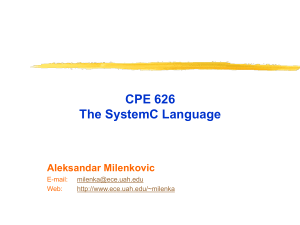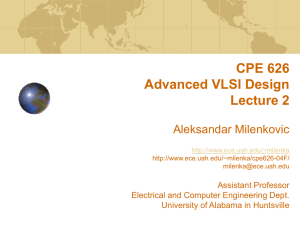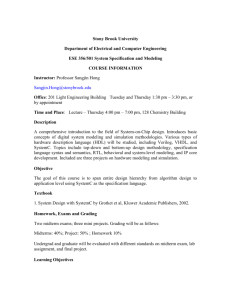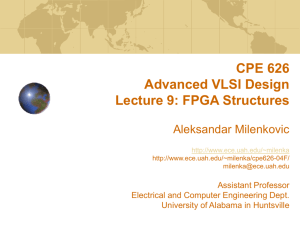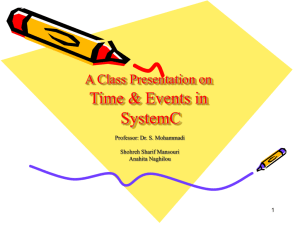cpe626-SystemC
advertisement
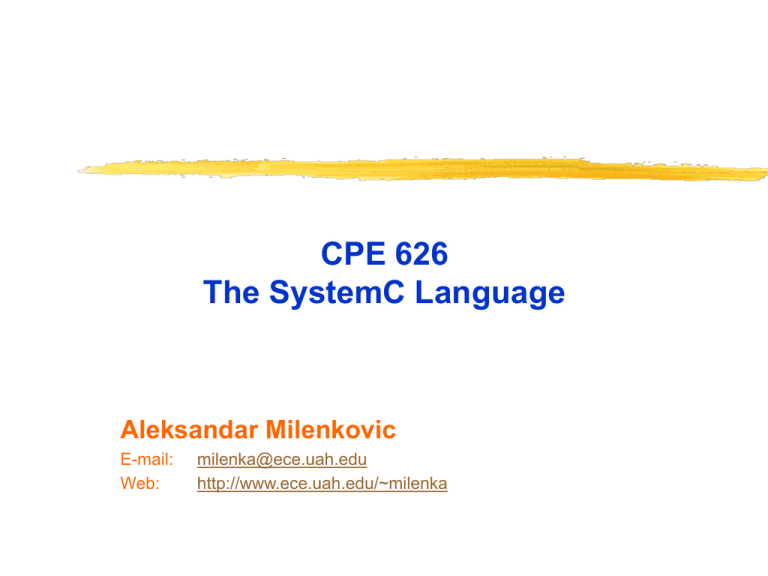
CPE 626
The SystemC Language
Aleksandar Milenkovic
E-mail:
Web:
milenka@ece.uah.edu
http://www.ece.uah.edu/~milenka
Outline
Motivation for SystemC
What is SystemC?
Modules
Processes
A. Milenkovic
2
Standard Methodology for ICs
System-level designers write a
C or C++ model
Written in a stylized,
hardware-like form
Sometimes refined to be
more hardware-like
C/C++ model simulated to
verify functionality
Parts of the model to be implemented in
hardware are given to Verilog/VHDL coders
Verilog or VHDL specification written
Models simulated together to test equivalence
Verilog/VHDL model synthesized
A. Milenkovic
3
Designing Big Digital Systems
Current conditions
Every system company was doing this differently
Every system company used its own simulation library
System designers don’t know Verilog or VHDL
Verilog or VHDL coders don’t understand system design
Problems with standard methodology:
Manual conversion from C to HDL
o Error prone and time consuming
Disconnect between system model and HDL model
o C model becomes out of date as changes are made
only to the HDL model
System testing
o Tests used for C model cannot be run against HDL model =>
they have to be converted to the HDL environment
A. Milenkovic
4
Idea of SystemC
C and C++ are being used as
ad-hoc modeling languages
Why not formalize their use?
Why not interpret them as
hardware specification languages
just as Verilog and VHDL were?
SystemC developed at Synopsys to do just this
A. Milenkovic
5
SystemC Design Methodology
Refinement methodology
Design is slowly refined
in small sections to add necessary
hardware and timing constructs
Written in a single language
higher productivity due to
modeling at a higher level
testbenches can be reused
saving time
Future releases will have constructs to model RTOS
A. Milenkovic
6
What Is SystemC?
A subset of C++ that models/specifies
synchronous digital hardware
A collection of simulation libraries that can be used
to run a SystemC program
A compiler that translates
the “synthesis subset” of SystemC into a netlist
A. Milenkovic
7
What Is SystemC?
Language definition is publicly available
Libraries are freely distributed
Compiler is an expensive commercial product
See www.systemc.org for more information
A. Milenkovic
8
Quick Overview
A SystemC program consists of module definitions
plus a top-level function that starts the simulation
Modules contain processes (C++ methods) and
instances of other modules
Ports on modules define their interface
Rich set of port data types (hardware modeling, etc.)
Signals in modules convey information between instances
Clocks are special signals that run periodically and
can trigger clocked processes
Rich set of numeric types
(fixed and arbitrary precision numbers)
A. Milenkovic
9
Modules
Hierarchical entity
Similar to Verilog’s module
Actually a C++ class definition
Simulation involves
Creating objects of this class
They connect themselves together
Processes in these objects (methods) are called
by the scheduler to perform the simulation
A. Milenkovic
10
Modules
SC_MODULE(mymod) {
// struct mymod : sc_module {
/* port definitions */
/* signal definitions */
/* clock definitions */
/* storage and state variables */
/* process definitions */
SC_CTOR(mymod) {
/* Instances of processes and modules */
}
};
A. Milenkovic
11
Ports
Define the interface to each module
Channels through which data is communicated
Port consists of a direction
input
sc_in
output
sc_out
bidirectional sc_inout
SC_MODULE(mymod) {
and any C++ or
sc_in<bool> load, read;
SystemC type
sc_inout<int> data;
sc_out<bool> full;
/* rest of the module */
};
A. Milenkovic
12
Signals
Convey information between modules within a module
Directionless: module ports define direction of data transfer
Type may be any C++ or built-in type
SC_MODULE(mymod) {
/* port definitions */
sc_signal<sc_uint<32> > s1, s2;
sc_signal<bool> reset;
/* … */
SC_CTOR(mymod) {
/* Instances of modules that connect to the signals
*/
}
};
A. Milenkovic
13
Instances of Modules
Each instance is a pointer to an object in the module
Connect instance’s
ports to signals
SC_MODULE(mod1) { … };
SC_MODULE(mod2) { … };
SC_MODULE(foo) {
mod1* m1;
mod2* m2;
sc_signal<int> a, b, c;
SC_CTOR(foo) {
m1 = new mod1(“i1”); (*m1)(a, b, c);
m2 = new mod2(“i2”); (*m2)(c, b);
}
};
A. Milenkovic
14
Positional Connection
// filter.h
#include "systemc.h“ // systemC classes
#include "mult.h“
// decl. of mult
#include "coeff.h“
// decl. of coeff
#include "sample.h“ // decl. of sample
SC_MODULE(filter) {
sample *s1;
// pointer declarations
coeff *c1;
mult *m1;
// signal declarations
sc_signal<sc_uint<32> > q, s, c;
SC_CTOR(filter) { // constructor
s1 = new sample ("s1"); // create obj.
(*s1)(q,s); // signal mapping
c1 = new coeff ("c1");
(*c1)(c);
m1 = new mult ("m1");
(*m1)(s,c,q);
}
}
A. Milenkovic
15
Named Connection
#include "systemc.h“ // systemC classes
#include "mult.h“
// decl. of mult
#include "coeff.h“
// decl. of coeff
#include "sample.h“ // decl. of sample
SC_MODULE(filter) {
sample *s1;
coeff *c1;
mult *m1;
sc_signal<sc_uint<32> > q, s, c;
SC_CTOR(filter) {
s1 = new sample ("s1");
s1->din(q); // din of s1 to signal q
s1->dout(s); // dout to signal s
c1 = new coeff ("c1");
c1->out(c); // out of c1 to signal c
m1 = new mult ("m1");
m1->a(s); // a of m1 to signal s
m1->b(c); // b of m1 to signal c
m1->q(q); // q of m1 to signal c
}
}
A. Milenkovic
16
Internal Data Storage
Local variables to store data within a module
May be of any legal C++, SystemC, or user-defined type
Not visible outside the module unless it is made explicitly
// count.h
#include "systemc.h"
SC_MODULE(count) {
sc_in<bool> load;
sc_in<int> din; // input port
sc_in<bool> clock; // input port
sc_out<int> dout; // output port
int count_val; // internal data storage
void count_up();
SC_CTOR(count) {
SC_METHOD(count_up); //Method process
sensitive_pos << clock;
}
};
A. Milenkovic
// count.cc
#include "count.h"
void count::count_up() {
if (load) {
count_val = din;
} else {
// could be count_val++
count_val = count_val + 1;
}
dout = count_val;
}
17
Processes
Only thing in SystemC that actually does anything
Functions identified to the SystemC kernel and
called whenever signals these processes are sensitive to
change value
Statements are executed sequentially
until the end of the process occurs,
or the process is suspended using wait function
Very much like normal C++ methods
+ Registered with the SystemC kernel
Like Verilog’s initial blocks
A. Milenkovic
18
Processes (cont’d)
Processes are not hierarchical
no process can call another process directly
can call other methods and functions that are not processes
Have sensitivity lists
signals that cause the process to be invoked,
whenever the value of a signal in this list changes
Processes cause other processes to execute
by assigning new values to signals in the sensitivity lists of
the processes
To trigger a process, a signal in the sensitivity list
of the process must have an event occur
A. Milenkovic
19
Three Types of Processes
Determines how the process is called and executed
METHOD
Models combinational logic
THREAD
Models testbenches
CTHREAD
Models synchronous FSMs
A. Milenkovic
20
METHOD Processes
Triggered in response to changes on inputs
Cannot store control state between invocations
Designed to model blocks of combinational logic
A. Milenkovic
21
METHOD Processes
Process is simply a
method of this class
SC_MODULE(onemethod) {
sc_in<bool> in;
sc_out<bool> out;
void inverter();
SC_CTOR(onemethod) {
SC_METHOD(inverter);
sensitive(in);
}
};
A. Milenkovic
Instance of this
process created
and made sensitive
to an input
22
METHOD Processes
Invoked once every time input “in” changes
Should not save state between invocations
Runs to completion: should not contain infinite loops
Not preempted
void onemethod::inverter() {
bool internal;
internal = in;
out = ~internal;
}
A. Milenkovic
Read a value from the port
Write a value to an
output port
23
THREAD Processes
Triggered in response to changes on inputs
Can suspend itself and be reactivated
Method calls wait() function that suspends process execution
Scheduler runs it again when an event occurs
on one of the signals the process is sensitive to
Designed to model just about anything
A. Milenkovic
24
THREAD Processes
Process is simply a
method of this class
SC_MODULE(onemethod) {
sc_in<bool> in;
sc_out<bool> out;
void toggler();
SC_CTOR(onemethod) {
Instance of this
process created
SC_THREAD(toggler);
sensitive << in;
alternate sensitivity
list notation
}
};
A. Milenkovic
25
THREAD Processes
Reawakened whenever an input changes
State saved between invocations
Infinite loops should contain a wait()
void onemethod::toggler() {
bool last = false;
for (;;) {
last = in; out = last; wait();
last = ~in; out = last; wait();
}
}
A. Milenkovic
Relinquish control
until the next
change of a signal
on the sensitivity
list for this process
26
CTHREAD Processes
Triggered in response to a single clock edge
Can suspend itself and be reactivated
Method calls wait to relinquish control
Scheduler runs it again later
Designed to model clocked digital hardware
A. Milenkovic
27
CTHREAD Processes
SC_MODULE(onemethod) {
sc_in_clk clock;
sc_in<bool> trigger, in;
sc_out<bool> out;
Instance of this
process created and
relevant clock edge
assigned
void toggler();
SC_CTOR(onemethod) {
SC_CTHREAD(toggler, clock.pos());
}
};
A. Milenkovic
28
CTHREAD Processes
Reawakened at the edge of the clock
State saved between invocations
Infinite loops should contain a wait()
Relinquish control
until the next clock
cycle in which the
trigger input is 1
void onemethod::toggler() {
bool last = false;
for (;;) {
wait_until(trigger.delayed() == true);
last = in; out = last; wait();
last = ~in; out = last; wait();
}
}
Relinquish control until
the next clock cycle
A. Milenkovic
29
A CTHREAD for Complex Multiply
struct complex_mult : sc_module {
sc_in<int> a, b, c, d;
sc_out<int> x, y;
sc_in_clk
clock;
void do_mult() {
for (;;) {
x = a * c - b * d;
wait();
y = a * d + b * c;
wait();
}
}
SC_CTOR(complex_mult) {
SC_CTHREAD(do_mult, clock.pos());
}
};
A. Milenkovic
30
Put It All Together
Process Type
SC_METHOD
SC_THREAD
SC_CTHREAD
Exec. Trigger
Signal Events
Signal Events
Clock Edge
Exec.
Suspend
NO
YES
YES
Infinite Loop
NO
YES
YES
Suspend /
Resume by
N.A.
wait()
wait()
wait_until()
Construct &
Sensitize
Method
SC_METHOD(call_back);
sensitive(signals);
sensitive_pos(signals);
sensitive_neg(signals);
SC_THREAD(call_back);
sensitive(signals);
sensitive_pos(signals);
sensitive_neg(signals);
SC_CTHREAD(
call_back,
clock.pos());
SC_CTHREAD(
call_back,
clock.neg());
A. Milenkovic
31
Watching
SC_THREAD and SC_CTHREAD processes typically
have infinite loops that will continuously execute
Use watching construct to jump out of the loop
Watching construct will monitor a specified condition
When condition occurs control is transferred
from the current execution point
to the beginning of the process
A. Milenkovic
32
Watching: An Example
// datagen.h
#include "systemc.h"
SC_MODULE(data_gen) {
sc_in_clk clk;
sc_inout<int> data;
sc_in<bool> reset;
void gen_data();
SC_CTOR(data_gen){
SC_CTHREAD(gen_data, clk.pos());
watching(reset.delayed() == true);
}
};
// datagen.cc
#include "datagen.h"
void gen_data() {
if (reset == true) {
data = 0;
}
while (true) {
data = data + 1;
wait();
data = data + 2;
wait();
data = data + 4;
wait();
}
}
Watching expressions are tested at the wait() or wait_until() calls.
All variables defined locally will lose their value on the control exiting.
A. Milenkovic
33
Local Watching
Allows us to specify exactly
which section of the process is watching which signal, and
where event handlers are located
W_BEGIN
// put the watching declarations here
watching(...);
watching(...);
W_DO
// This is where the process functionality goes
...
W_ESCAPE
// This is where the handlers
// for the watched events go
if (..) {
...
}
W_END
A. Milenkovic
34
SystemC Types
SystemC programs may use any C++ type along with any
of the built-in ones for modeling systems
SystemC Built-in Types
sc_bit, sc_logic
o Two- and four-valued single bit
sc_int, sc_unint
o 1 to 64-bit signed and unsigned integers
sc_bigint, sc_biguint
o arbitrary (fixed) width signed and unsigned integers
sc_bv, sc_lv
o arbitrary width two- and four-valued vectors
sc_fixed, sc_ufixed
o signed and unsigned fixed point numbers
A. Milenkovic
35
Fixed and Floating Point Types
Integers
Precise
Manipulation is fast and cheap
Poor for modeling continuous real-world behavior
Floating-point numbers
Less precise
Better approximation to real numbers
Good for modeling continuous behavior
Manipulation is slow and expensive
Fixed-point numbers
Worst of both worlds
Used in many signal processing applications
A. Milenkovic
36
Integers, Floating-point, Fixed-point
Decimal (“binary”)
point
Integer
Fixed-point
Floating-point
2
A. Milenkovic
37
Using Fixed-Point Numbers
High-level models usually use floating-point for convenience
Fixed-point usually used in hardware implementation
because they’re much cheaper
Problem: the behavior of the two are different
How do you make sure your algorithm still works after it’s
been converted from floating-point to fixed-point?
SystemC’s fixed-point number classes facilitate simulating
algorithms with fixed-point numbers
A. Milenkovic
38
SystemC’s Fixed-Point Types
sc_fixed<8, 1, SC_RND, SC_SAT> fpn;
8 is the total number of bits in the type
1 is the number of bits to the left of the decimal point
SC_RND defines rounding behavior
SC_SAT defines saturation behavior
A. Milenkovic
39
Rounding
What happens when your result doesn’t land exactly on a
representable number?
Rounding mode makes the choice
A. Milenkovic
40
SC_RND
Round up at 0.5
What you expect?
A. Milenkovic
41
SC_RND_ZERO
Round toward zero
Less error accumulation
A. Milenkovic
42
SC_TRN
Truncate
Easiest to implement
A. Milenkovic
43
Overflow
What happens if the result is too positive or too negative to
fit in the result?
Saturation? Wrap-around?
Different behavior appropriate for different applications
A. Milenkovic
44
SC_SAT
Saturate
Sometimes desired
A. Milenkovic
45
SC_SAT_ZERO
Set to zero
Odd behavior
A. Milenkovic
46
SC_WRAP
Wraparound
Easiest to implement
A. Milenkovic
47
SystemC Semantics
Cycle-based simulation semantics
Resembles Verilog, but does not allow the modeling of
delays
Designed to simulate quickly and resemble most
synchronous digital logic
A. Milenkovic
48
Clocks
The only thing in SystemC that has a notion of real time
Only interesting part is relative sequencing among multiple
clocks
Triggers SC_CTHREAD processes
or others if they decided to become sensitive to clocks
A. Milenkovic
49
Clocks
sc_clock clock1(“myclock”, 20, 0.5, 2, false);
Time Zero
Initial value is false
20
0.5 of 20
2
A. Milenkovic
50
SystemC 1.0 Scheduler
Assign clocks new values
Repeat until stable
Update the outputs of triggered SC_CTHREAD processes
Run all SC_METHOD and SC_THREAD processes whose inputs
have changed
Execute all triggered SC_CTHREAD methods. Their outputs
are saved until next time
A. Milenkovic
51
Scheduling
Clock updates outputs of SC_CTHREADs
SC_METHODs and SC_THREADs respond to this change
and settle down
Bodies of SC_CTHREADs compute the next state
Sync.
Async.
Clock
A. Milenkovic
52
Why Clock Outputs?
Why not allow Mealy-machine-like behavior in FSMs?
Difficult to build large, fast systems predictably
Easier when timing worries are per-FSM
Synthesis tool assumes all inputs arrive at the beginning of
the clock period and do not have to be ready
Alternative would require knowledge of inter-FSM timing
A. Milenkovic
53
Implementing SystemC
Main trick is implementing SC_THREAD and SC_CTHREAD’s
ability to call wait()
Implementations use a lightweight threads package
/* … */
wait();
/* … */
Instructs thread package to save
current processor state (register,
stack, PC, etc.) so this method can
be resumed later
A. Milenkovic
54
Implementing SystemC
Other trick is wait_until()
wait_until(continue.delayed() == true);
Expression builds an object that can check the condition
Instead of context switching back to the process, scheduler
calls this object and only runs the process if the condition
holds
A. Milenkovic
55
Determinism in SystemC
Easy to write deterministic programs in SystemC
Don’t share variables among processes
Communicate through signals
Don’t try to store state in SC_METHODs
Possible to introduce nondeterminism
Share variables among SC_CTHREADs
o They are executed in nondeterministic order
Hide state in SC_METHODs
o No control over how many times they are invoked
Use nondeterministic features of C/C++
A. Milenkovic
56
Synthesis Subset of SystemC
At least two
“Behavioral” Subset
Implicit state machines permitted
Resource sharing, binding, and allocation done automatically
System determines how many adders you have
Register-transfer-level Subset
More like Verilog
You write a “+”, you get an adder
State machines must be listed explicitly
A. Milenkovic
57
Do People Use SystemC?
Not as many as use Verilog or VHDL
Growing in popularity
People recognize advantage of being able to share models
Most companies were doing something like it already
Use someone else’s free libraries? Why not?
A. Milenkovic
58
Conclusions
C++ dialect for modeling digital systems
Provides a simple form of concurrency
Cooperative multitasking
Modules
Instances of other modules
Processes
A. Milenkovic
59
Conclusions
SC_METHOD
Designed for modeling purely functional behavior
Sensitive to changes on inputs
Does not save state between invocations
SC_THREAD
Designed to model anything
Sensitive to changes
May save variable, control state between invocations
SC_CTHREAD
Models clocked digital logic
Sensitive to clock edges
May save variable, control state between invocations
A. Milenkovic
60
Conclusions
Perhaps even more flawed than Verilog
Verilog was a hardware modeling language forced into
specifying hardware
SystemC forces C++, a software specification language,
into modeling and specifying hardware
Will it work? Time will tell.
A. Milenkovic
61
An Example Process
Determines how the process is called and executed
// dff.h
#include "systemc.h"
SC_MODULE(dff) {
sc_in<bool> din;
sc_in<bool> clock;
sc_out<bool> dout;
void doit();
// data input
// clock input
// data output
// dff.cc
#include "dff.h"
void dff::doit() {
dout = din;
}
// method in the module
SC_CTOR(dff) { // constructor
SC_METHOD(doit); // doit type is SC_METHOD
// method will be called whenever a
// positive edge occurs on port clock
sensitive_pos << clock;
}
};
A. Milenkovic
62
